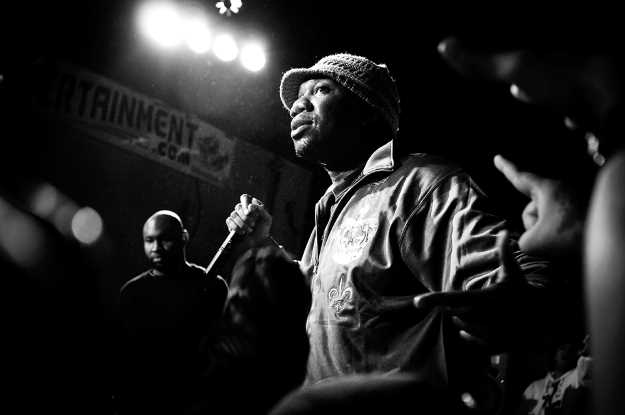| |
Taken from Salt Lake City Weekly (Sep 05, 2018)
The One and Only
Hip-hop pioneer KRS-One drops 40 years of knowledge.
by Nick McGregor

KRS-One - PARKER |
"Rap is something you do; hip-hop is something you live."
If Afrika Bambaataa is the Godfather of Hip-Hop, and Kool Herc is the original King, one undisputed title is still left to be claimed: the Teacha. From the beginning of his career, KRS-One-born Lawrence Parker in the Bronx in 1965-committed himself to fulfilling that role, studying, practicing and sharpening his verbal blades to the point that his first group, Boogie Down Productions, inaugurated hip-hop as more than just entertainment. They elevated it to an art form worthy of political activism and social advocacy.
Of course, as a hip-hop pioneer, nothing came easy for KRS-One, which stands for Knowledge Reigns Supreme Over Nearly Everyone. He left home at age 16 to pursue his hip-hop dreams at a time when hardly anyone was making a full-time living at it. Ending up in a South Bronx homeless shelter, he met youth counselor Scott Sterling, who decided to back his bombastic new MC friend as DJ Scott La Rock. The duo's first album as Boogie Down Productions, 1987'sCriminal Minded, set the template for hardcore hip-hop, with Scott sampling everyone from James Brown to Billy Joel to Jamaican dancehall, and KRS publicly battling hip-hop dignitaries Marley Marl and MC Shan over hip-hop's true birthplace (Marl claimed Queens; KRS claimed the Bronx). Even more seminal, Scott and KRS appeared on the cover of Criminal Minded brandishing firearms and ammunition, a first for the popular-music world.
But their posturing was meant to skewer the violence and drugs that plagued African-American communities, along with satirizing white America's fetishization of it. In 1988, however, DJ Scott La Rock was gunned down in a random street shootout, which was followed months later by the death of a fan at a KRS-One/Public Enemy concert. In those Republican-dominated days, such headline-stealing histrionics weren't welcomed kindly by parents, politicians and the Christian right. With Boogie Down Productions' future in jeopardy, Warner Brothers torpedoed BDP's record deal, but KRS persevered, starting the nonprofit group Stop The Violence decades before Black Lives Matter rose to prominence and pivoting toward conscious, epistemological hip-hop on seminal albumsGhetto Music: The Blueprint of Hip HopandEdutainment.
In the '90s, KRS-One went solo, expanding his profile exponentially: a guest spot with alterna-rock heroes R.E.M.; a fawning tribute from reggae-rock icons Sublime; a hip-hop/New Wave interpolation with Blondie; a remix with Puff Daddy. But mainstream attention didn't fit the Scholar well, and today his early solo period is more well-known for the "WOOP WOOP" refrain of racial profiling anthem "Sound of da Police," criminal-justice reform crusade "Free Mumia" and a lengthy anti-corporate feud with the BBC.
Since then, KRS has focused on promoting hip-hop at every opportunity. He founded the Temple of Hip-Hop Ministry, Archive, School and Society to perpetuate Afrika Bambaataa's overarching idea that the art form was a deliberate attempt to effect positive change on the world. He worked as an A&R executive at Warner Brothers and Reprise to recruit young conscious rappers into the major-label fold. He wrote a 600-page religious treatise calledThe Gospel of Hip-Hop: The First Instrument as a blueprint for a new rap religion.
Today, instead of granting interviews to publications seeking to preview his performances, he devotes his free time to lecturing at colleges, standing up for free speech and dissecting police brutality on cable news. In 2015, when the Tucson, Ariz., school system tried to ban KRS-One's essay "An Introduction to Hip Hop," the rap philosopher traveled there and spoke to hundreds of high school students about self-worth, cultural inclusion and ethnic solidarity. After his speech, he of course busted out an impromptu performance, including a freestyle rendition of his version of hip-hop history, where he recaps 45 years of highlights and low blows, one line per year.
"I introduced the concept of being hip-hop, not just doing it," he told The AV Club way back in 2001, when today's SoundCloud rappers were still in diapers and the deaths of Tupac Shakur and The Notorious B.I.G. were still fresh on people's minds. "The concept of rap is something we do, while hip-hop is something we live ... That's the single most important contribution that I can offer. I make intelligence cool. I make spirituality cool. If we can make one's devotion to God cool, then I think I did a great thing. I can rest in peace."
|
|